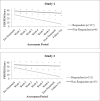Trajectories of response to treatment for posttraumatic stress disorder
- PMID: 23046781
- PMCID: PMC3499132
- DOI: 10.1016/j.beth.2012.04.003
Trajectories of response to treatment for posttraumatic stress disorder
Abstract
Research on the predictors of response to cognitive-behavioral treatments for PTSD has often produced inconsistent or ambiguous results. We argue this is in part due to the use of statistical techniques that explore relationships among the entire sample of participants rather than homogeneous subgroups. Using 2 large randomized controlled trials of Cognitive Processing Therapy (CPT), CPT components, and Prolonged Exposure, we employed growth mixture modeling to identify distinct trajectories of treatment response and to determine the predictors of those trajectories. We determined that the participants' trajectories could be best represented by 2 latent classes, which we subsequently labeled responders (87% of the sample) and nonresponders (13% of the sample). Notably, there was not a separate class for partial responders. Assignment to the nonresponder class was associated with receiving the written accounts (WA) component of CPT, a pretreatment diagnosis of major depression (MDD), and more pretreatment hyperarousal symptoms. Thus, it appears that some individuals do not benefit from merely writing about their trauma and processing it with the therapist; they may also need to engage in cognitive restructuring to successfully ameliorate their symptoms. Additionally, those who meet criteria for MDD or have high levels of hyperarousal at the onset of treatment might require additional treatment or support.
Copyright © 2012. Published by Elsevier Ltd.
Figures
References
-
- American Psychiatric Association . Diagnostic and statistical manual of mental disorders. 4th ed. Author; Washington, DC: 1994.
-
- Beck AT. Cognitive therapy and the emotional disorders. International Univeristies Press; New York: 1976.
-
- Benish SG, Imel ZE, Wampold BE. The relative efficacy of bona fide psychotherapies for treating post-traumatic stress disorder: A meta-analysis of direct comparisons. Clinical Psychology Review. 2008;28:746–758. - PubMed
-
- Berger AM, Knutson JF, Mehm JG, Perkins KA. The self-report of punitive childhood experiences of young adults and adolescents. Child Abuse and Neglect. 1988;12:251–262. - PubMed
-
- Blake DD, Weathers FW, Nagy LM, Kaloupek DG, Gusman FD, Charney DS, Keane TM. The development of a Clinician-Administered PTSD Scale. Journal of Traumatic Stress. 1995;8:75–90. - PubMed
Publication types
MeSH terms
Grants and funding
LinkOut - more resources
Full Text Sources
Medical


